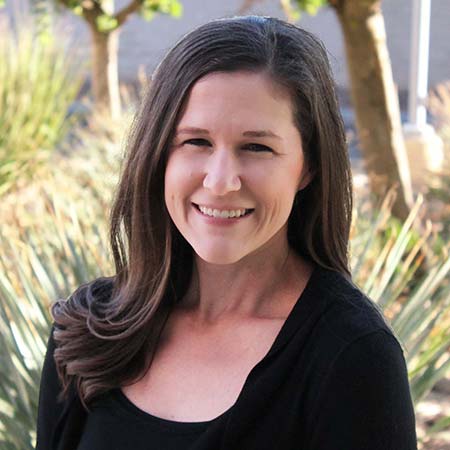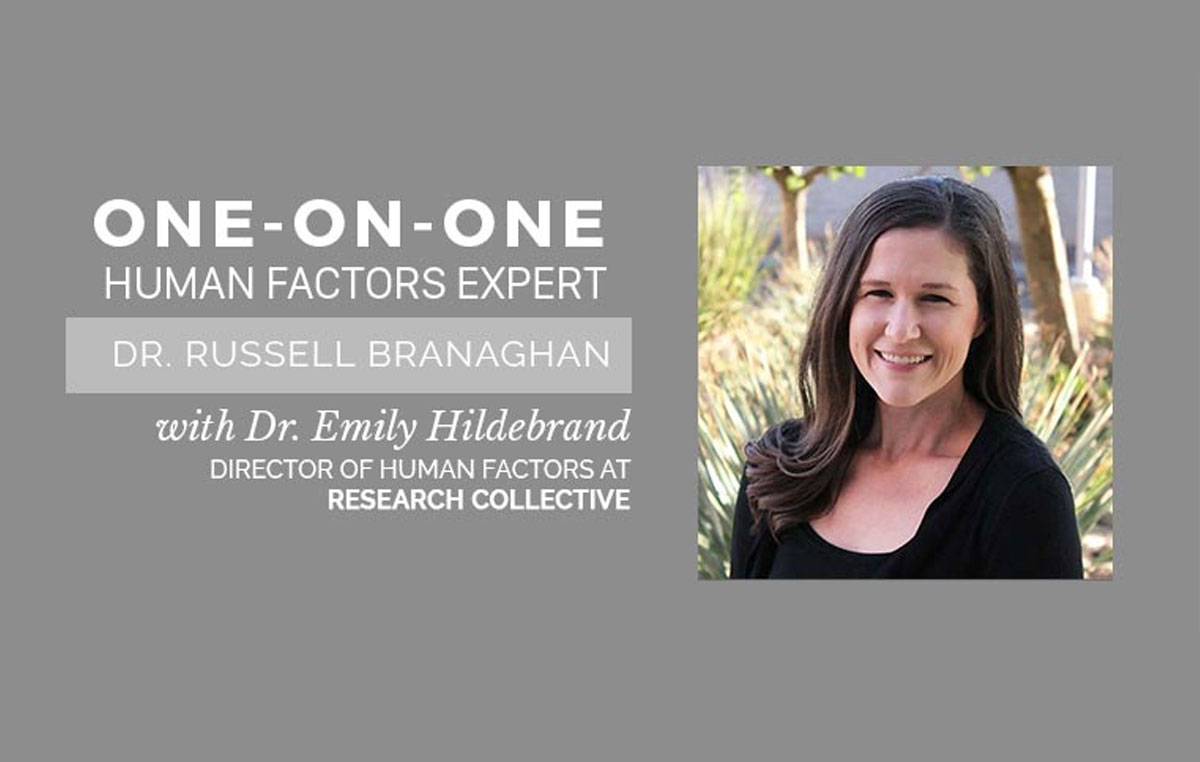Each month, we interview a human factors expert to get their take on the Human Factors and User Experience industry. In this month’s installment, Russ sat down with the most recent human factors expert to join our team, Emily Hildebrand…
Russ: Tell us a little bit about your background in Human Factors?
Emily: Over the last 10 years, I’ve been fortunate to build my career with great experiences doing both human factors-related research and consulting on human factors issues much of the time with an emphasis in the field of healthcare and medical devices. After finishing my Master’s of Science degree in Applied Psychology, I led a research group, the Center for Evaluation of Human Factors in Reprocessing Safety, at the Phoenix VA Health Care System. Over the course of 3 years, we studied human factors issues involved in the reprocessing practices of reusable medical equipment. I’m proud that this research culminated in publications and design guidance recommendations to the FDA and AAMI for improving the usability of reprocessing instructions. During this time, I also decided I to return to Arizona State to complete my PhD in Applied Cognitive Science. While completing my degree, I worked as a consultant for a small consultancy that largely assisted companies in executing the human factors studies necessary for medical device submissions to FDA. I was also incredibly fortunate to complete a research associateship with the Mayo Clinic, in Rochester, MN where I performed prospective observations in the operating room to study surgical teamwork, handoffs, and flow disruptions. That research culminated in my dissertation work on surgical team communication. Prior to coming to Research Collective, I worked as a Senior Scientist consultant in the human factors group at Exponent, the largest engineering consulting firm of its kind, where I managed product design and user experience-related projects for Fortune 100 and Fortune 500 clients across a variety of fields including medical devices, consumer products, instructional materials, and websites. At Exponent, I also gained extensive experience with product failure analysis and expert witness litigation support in the field of human factors, which has given me a really comprehensive perspective when approaching human factors issues in general. Being at Research Collective now for a little over a month, I’m excited to leverage my research and consulting experience and contribute to the exciting work that is being done on current and upcoming projects.
Russ: What have been a few favorite projects that you’ve worked on?
Emily: One of my favorite projects to date is the research I conducted at the Mayo Clinic as part of my dissertation. I find human factors work to be most exciting when you can really immerse yourself in the given environment in which you are working to solve problems. At the Mayo Clinic, I was given open access to the OR and was able to attend surgeries at will, interview surgical team members as needed, and fully collaborate with providers to improve upon existing practices. It’s much easier to understand the needs and challenges faced by a surgical team when you have literally been in their shoes, standing on your feet in a surgical operating room for 8+ hours, listening to the same alarms on machines, dealing with the same lighting, wearing the same personal protective equipment, and observing the same conversations.
Russ: Why have you chosen to go the consulting route for most of your career vs. working in large corporation?
Emily: I was exposed to the idea of consulting while still completing my Master’s degree. I completed an internship at Exponent during that time as was fascinated by the breadth of projects that a human factors consultant could work on. There is a lot of value to becoming highly specialized in one area or discipline, but part of what makes human factors so fun is that humans are involved with everything. So, if you have a strong foundation in human cognition, for example, you can apply that knowledge to all basic human interactions. Whether someone is using a medical device, driving a car, or navigating a website, the same basic cognitive capabilities and limitations of humans are going to guide your research and your design solutions. I love that consulting gives me the opportunity to work in a variety of contexts and exposes me to unique problems across a wide range of fields.
Russ: What’s been changing with medical human factors? What still needs to change?
Emily: Medical human factors has made some pretty incredible strides over the last 10 years, but, as with most things, there is still room for improvement. As the FDA and the EU continue to increase and improve their guidance regarding human factors for medical devices, I feel that many manufacturers have taken note and heeded their recommendations by looking to human factors professionals, either internally or externally, for assistance in performing necessary human factors work for their products, especially for regulatory submissions. However, as evidenced by the extensive product failure analysis and litigation work I was exposed to while at Exponent, there are medical device manufacturers that could still benefit from incorporating human factors and user experience research earlier on in the product development life cycle or at all. It’s not enough to do human factors testing in order to just “check a box” for a regulatory submission. To get the most value and create safe, effective and easy-to-use products, it is best when human factors and user experience research is incorporated as early as possible and iterated on throughout the product life-cycle.
Russ: Going forward, what are some of your goals?
Emily: Moving forward, my goals in general are always to continue learning and growing as a human factors professional. At Research Collective specifically, I’m truly excited to help build upon the strong foundation of excellent service that has been established by Russ, Bryant, and Tonya. I look forward to continuing to help grow our capabilities in consulting for medical device manufacturers as well as further developing other areas (e.g., consumer products and technology) of human factors and user experience research.
 Dr. Emily Hildebrand, Director of Human Factors, Research Collective
Dr. Emily Hildebrand, Director of Human Factors, Research Collective
Dr. Emily Hildebrand is a cognitive scientist by training with specialized expertise in human factors along with 8+ years of healthcare-specific experience. Emily has performed various human factors evaluations such as usability testing, workflow studies, and use-error analyses with regard to medical devices, systems, and environments for industry-leading clients. Her industry experience includes managing product design and user experience-related projects for Fortune 100 and Fortune 500 clients across a variety of fields including medical devices, consumer products, instructional materials, and internet sites. She also has extensive experience with product failure analysis and expert witness litigation support. Emily earned her Ph.D. in Applied Cognitive Science at Arizona State University, during which time she worked at the Mayo Clinic performing prospective observations in the operating room and conducting research on surgical teamwork, handoffs, and flow disruptions. Prior to that, Emily conducted research at the Phoenix VA Health Care System to determine human factors issues involved in the reprocessing practices of reusable medical equipment. This research culminated in design guidance recommendations to FDA and AAMI for improving the usability of reprocessing instructions for use (IFU).




